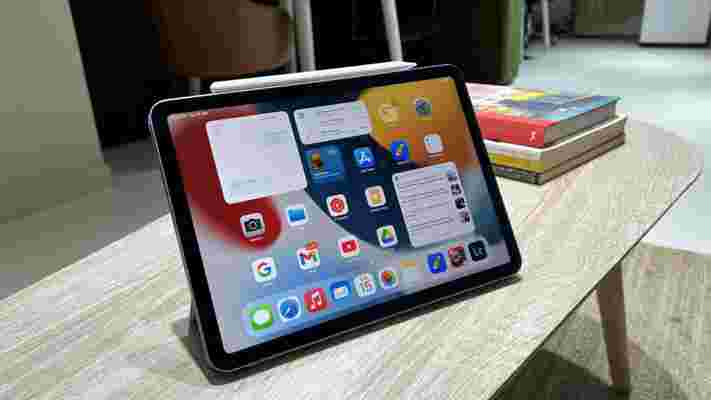The AirPods Pro are among the most popular noise-canceling wireless earbuds on the planet, and they're a firm favorite here at TechRadar. However, if the latest rumors are to be believed, Apple is planning to retire them in the next few months.
That's according to respected analyst Ming-Chi Kuo, who claimed in a tweet that Apple is planning to kill off the AirPods Pro to make way for the next-generation: the long-awaited AirPods Pro 2 , which Kuo says will launch in the second quarter of 2022.
That means we could see the next generation of Apple wireless earbuds by June.
The decision to cull the two-and-a-half year-old true wireless earbuds is down to the disappointing sales of the AirPods 3 , according to Kuo. Apple has apparently attributed this to its decision to keep their predecessors, the AirPods 2 , on sale when the third-gen AirPods launched in 2021.
The AirPods 2 were also given a rather attractive price cut when the AirPods 3 were announced - and that might be why demand for the newer earbuds has been less fervent than Apple expected. Kuo says that, as a result, Apple reducing is its third-generation AirPods orders from suppliers by at least 30% in the second to third quarter of this year.
Weaker than expected sales must have been discouraging for Apple. The AirPods 3 are, by nearly every metric, a better pair of true wireless earbuds than their predecessors, offering improved sound quality, support for Spatial Audio , and better integration with the brand's wider network.
Seemingly, that wasn't enough to encourage the kind of sales Apple enjoyed with the AirPods 2 - and with lots of true wireless earbuds to choose from these days, this could be a sign that the brand's domination of the market is waning.
Bad news for money-savers

Kuo's claims mean that anyone who was hoping the AirPods Pro would be given a discount when the AirPods Pro 2 are released could be disappointed.
That's a shame, because the original AirPods Pro are still a great pair of in-ear headphones, even if they are nearly three years old now - and they still have a spot on our list of the best noise-cancelling earbuds .
Saying that, you'll probably be able to buy the AirPods Pro for some time after the release of their successors - third-party retailers will have stock to get rid of, and that means we could be in for some really impressive AirPods deals over Prime Day and Black Friday later this year.
If some of the AirPods Pro 2 rumors we've heard are to be believed, you might not want to stick with the original earbuds anyway. It's been claimed that the second-gen buds will come with improved active noise cancellation, support for ALAC (Apple Lossless Audio Codec), fitness tracking features, futuristic gesture controls and security features, and a charging case with 'Find My' support.
They might look very different to the AirPods Pro you're familiar with, too. A 2020 Bloomberg report claimed that the next AirPods Pro would get a design overhaul last year, eliminating the ear stems for a "more rounded shape that fills more of a user's ear".
Of course, this new design didn't materialize in 2021, but it's possible that Bloomberg simply preempted the release date - and that means the old AirPods Pro could look positively dated by the time the AirPods Pro 2 have been on the market for a few months.
It's important to note that there's no guarantee the AirPods Pro 2 will launch in Q2 of this year - but, with WWDC 2022 confirmed to be taking place on June 6, it feels like the time is ripe for a big announcement from Apple.
Call of Duty to trade annual releases for something potentially worse
Activision Blizzard has confirmed that the Call of Duty franchise will no longer release year-on-year.
Instead, the publisher is shifting to an 'always-on' live service business model that seems to put a greater focus on multiplayer-based transactions like season passes, playable operators, and more.
Notable Call of Duty news Twitter account CharlieIntel shared a statement from an Activision Blizzard spokesperson, alongside an internal company email which detailed plans for the publisher to convert all US-based QA (quality assurance) testers into full-time employees, likely in support of the Call of Duty franchise's greater shift to a live service model.
What this decision entails is that future Call of Duty titles – and further iterations of Warzone – should have a much longer period of support.
The best-case scenario here would be that all development teams working on Call of Duty projects will have more time to polish their games and multiplayer modes, with the QA team overhaul able to provide a greater level of support and feedback.
But what about the worst case?
What happens to Call of Duty from here?
Terms like 'always on' and 'live service' have developed a stigma over the years, and rightfully so, but not just because live service games strictly require players to be connected to the internet at all times.
Live service games, by definition, are on life support from day one. They more often than not rely on a constant stream of revenue from the player base in the form of season pass purchases, microtransactions, and other pieces of downloadable content. But even that comes after being able to maintain a large, healthy community of players that are content with the quality of the whole package.
Not that Call of Duty is in any real danger of experiencing a drought of players. Since the 2007 release of Call of Duty 4, the franchise has become one of the most played and most profitable in gaming's history. But that popularity becomes a double-edged sword when you look to convert your franchise to an 'always on' model.
What this shift in focus means for Activision Blizzard's development teams is that they're likely to be even more tied to Call of Duty than ever before. And when your games become constantly in need of patches, updates, emergency maintenance periods and the like, dev teams working in the CoD mines might not be granted agency to work on other popular Activision-owned franchises like Crash Bandicoot or Spyro the Dragon.

While live service models do have the potential to bring people together or offer unique experiences you won't find in other smaller scale multiplayer games (see Fortnite 's crossover extravaganza or Sea of Thieves ' epic high-seas adventuring), publishers operating live services need to make sure players are consistently satisfied.
We obviously can't speak to the overall quality of Call of Duty games going forward, but a much greater emphasis on live service models does leave us nervous. We may see fewer high-quality single-player campaigns, for example, less experimentation with time periods and settings (as championed by Call of Duty games including Black Ops, Infinite Warfare, and World at War).
Not to mention, this may also lead to less player agency overall. If the publisher decides to lean into 'FOMO' (fear of missing out, a common phenomenon often created by temporary content like battle passes and limited-time game modes), then it could very easily frustrate more players than it pleases.
The next iPad Pro needs to borrow this one iPad Air feature
I've used my iPad Pro for years now – obviously that means that I do like it, but there are two features that really ruin the experience for me.
The first is the battery life, but I know I can only get so annoyed at that. I've used the thing incessantly for several years, and Apple isn't exactly great with its product battery life anyway – I'm used to this now.
But there's one feature that some Apple fans paint as a positive, that I just hate for the iPad: Face ID.
Face ID sucks on iPads
I know Face ID is popular on iPhones, but I've found it doesn't work well at all. It rarely recognizes my face, and even when it does, it takes loads of rotating and fiddling with the device to angle it right. Oh, and simply picking up the phone is a chore when in-screen fingerprint sensors let me avoid this.
I'm admittedly comparing it to Android phone equivalents, which are a little less secure, but I'm not a secret agent or important celebrity – the odds of someone printing out a 3D copy of my face to hack into my phone is pretty rare.
I also found that Face ID doesn't take into account changes in my face – sometimes I have lots of facial hair and sometimes I don't. Sometimes I wear glasses and sometimes I don't. I've even found my hairstyle affects it, and don't get me started on face masks.
But if it's annoying on iPhones, it's downright bad on iPads.
That's because you need the sensors angled just right in iPhones for Face ID to work. That's not too hard if you're lifting the device up to your face to unlock it. But you're not exactly going to want to do the same on an iPad.
I always find myself craning my neck over my 12.9-inch iPad Pro to try and get it to unlock, or picking it up and twirling it around in my hands. That's not exactly easy given how huge it is.
Apple's Face ID might be great for small portable devices, but tablets are designed to be used on a desktop or work counter – given that Face ID requires you to be perfectly positioned in front of the sensors, the system of facial unlocking just isn't ideal.
Long live Touch ID

I think Apple knows that Face ID is bad on iPad models, because for other tablets, it's begun to avoid it.
The iPad Air 4 and Air 5 , as well as the Mini 6 , all use Touch ID embedded on power buttons on the edge of the tablet. A solution like this makes unlocking the slate so, so much easier – you can just reach out, and press the power button to boot it up.
Bear in mind that you have to touch the iPad Pro's power button anyway, to let it know you want to unlock via Face ID, so you're just cutting out a step with the button.
I wish I had this feature on my iPad Pro. It'd stop me having to do circus tricks to get the slate to notice me, and could let me easily boot up my video edit or movie stream without too much effort.
Coming to the iPad Pro?
I don't think Apple will drop Face ID any time soon, even though it's avoided bringing it to its mid-range tablets. That would be an admission that the tech doesn't work well, and Apple wouldn't do that without a new innovation to replace it with.
But I'd love to see the company bring Touch ID for its next iPad Pro models, which we expect to see in 2022. It'd be a consumer-friendly upgrade that would make the tablets much more usable.
iPad Pros are designed for professionals. These tablets are going on desks, or on laps on public transport, or being carried around in the field – using a very directional facial recognition tool just won't cut it.
Perhaps we could see both Face ID and Touch ID used as options for the tablet – if it's a pricey Pro model, Apple could afford to use both. But if it comes down to one or the other, I'm crossing my fingers to see Touch ID used more, not less, for future Apple devices.
